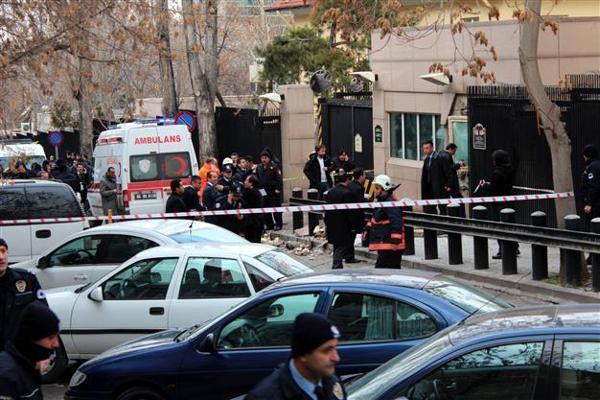Puzzling Greek connection revealed in embassy attack
ISTANBUL - Daily News with wires


Police scour the scene in the wake of DHKP/C member Ecevit Şanlı's suicide attack on the US Embassy in Ankara. AA Photo
Police investigations have revealed crucial details about the man responsible for the Feb. 1 attack on the U.S. Embassy in Ankara, including his illegal entrance into the country from Greece.The attacker, identified by state officials as former Revolutionary People’s Liberation Party/Front (DHKP/C) member Ecevit Şanlı, reportedly entered the country illegally through the Greek islands. Şanlı, 30, lived in Germany after entering the country in 2002 with a fake passport, and then applied for asylum in the country. He was initially rejected, but the decision was overturned after he appealed the decision.
The DHKP/C claimed responsibility for the attack a day after Şanlı detonated heavy explosives by the personnel entrance of the U.S. embassy, citing American policies in Syria, Egypt and Libya, according to Turkey’s state television. He was buried on the same day in his hometown Ordu, with a group of 50 people accompanying his family.
Şanlı had previously served time in prison between 1997 and 2000 for attacking an Istanbul military guest house, Harbiye Orduevi, with a flame thrower. He also participated in hunger strikes while being held in the Ümraniye Prison in 2000, a time when massive hunger strikes were initiated in Turkish prisons. Şanlı, who suffered from Wernicke Korsakoff syndrome, was released on probation in 2002.
His family had not made contact with him over 15 years, his father told daily Hürriyet, after he left his hometown of Ordu for Istanbul.
Turkish authorities immediately contacted German counterparts to try and map out Şanlı’s movements, working on possible connections to him in the country and abroad. His illegal entrance through the Greek islands, alongside those who may have helped him, is also currently being investigated.
A false identity card found on Şanlı was later identified as a 40-year-old Turkish citizen, who had handed his ID over to a group of people claiming to be organizing a football tournament in Istanbul.
Several other IDs were collected for the supposed tournament, which the organization reportedly used to make fake identification cards for members, daily Akşam reported.
Şanlı entered the embassy using the fake ID, claiming to be applying for U.S. visa before detonating six kilos of TNT on the site. The attack killed security guard Mustafa Akarsu and critically injured a former reporter, Didem Tucay.
The DHKP/C is listed as a terrorist organization by Turkey, the U.S. and the European Union, and has also been in the news lately over the government raids that detained and arrested many suspects, including lawyers, over alleged links to the organization.
US envoy thanks Turkish government, announces planned
moment of silence
The U.S. Embassy in Ankara and consulates around Turkey will
observe a minute of silence tomorrow to honor Mustafa Akarsu, a security guard
who died Feb. 1 defending the U.S. mission in the Turkish capital from a
suicide bomber.
“In honor of our fallen colleague, Mustafa Akarsu, I have directed that flags at the U.S. Embassy and our consulates in Turkey will fly at half staff until sunset on Wednesday Feb. 6. On Monday at 13:13, we will observe a moment of silence in Mustafa Bey’s memory, precisely 72 hours after the moment of his sacrifice,” Ricciardone said in a statement published on the U.S. embassy’s website.
Ricciardone also thanked the “outpouring sympathy” and support shown by the Turkish government, emphasizing the friendship between the two countries.
“The U.S. and Turkey have suffered from terrorism both separately and together. Such incidents only reinforce our shared will to defeat terrorists and to strengthen the rule of law which they aim to undermine. We will never yield to terror, and together we will prevail,” the statement read.
